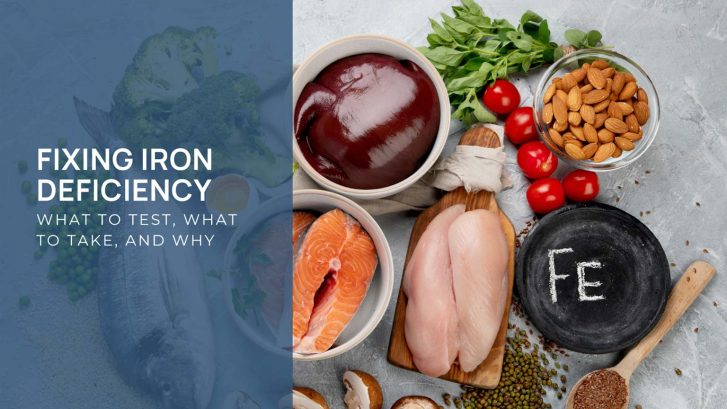With expert insights from Dr Libby Weaver’s book, Fix Iron First
Iron deficiency is one of the most common nutritional issues in Aotearoa, especially among women. If you’re feeling unusually tired, low in energy, or having trouble focusing, low iron levels could be a contributing factor.
But not all iron supplements are created equal. Before reaching for one, it’s essential to know what your body actually needs.
In her book Fix Iron First, nutritional biochemist Dr Libby Weaver explains what really works when it comes to restoring iron levels safely and effectively. In this article, we share her expert advice, along with how to test your levels and what to look for in a high-quality supplement.
1. Know Your Levels First
Symptoms of iron deficiency, such as fatigue, brain fog, pale skin, or dizziness, can be vague and overlap with those of other conditions. That’s why testing first is crucial.
The Smith Biomed Ferritin (Iron Deficiency) Test is an at-home finger-prick blood test that measures ferritin, your body’s iron storage protein. Low ferritin is a clear early indicator of iron deficiency, even before anaemia develops.
Testing first helps you:
- Confirm if low iron is actually the issue
- Avoid unnecessary supplementation
- Take the proper steps with your GP or health provider
If your test results show low ferritin levels, consult a doctor or a qualified health professional for personalised advice.
2. Support Iron Absorption Naturally
Iron doesn’t work alone. Your body needs the proper nutritional support to absorb and use it effectively.
Dr Libby highlights the importance of cofactors, nutrients that work with iron to support healthy levels:
- Vitamin C: boosts absorption
- Copper: helps transport iron in the blood
- Vitamin A & Beta-carotene: support storage and mobilisation
You can support your body’s iron uptake by:
- Pairing iron-rich foods with vitamin C (e.g. lentils + citrus, beef + capsicum).
- Avoid consuming coffee, tea, dairy products, or fibre supplements for at least two hours before or after eating iron-rich foods or taking an iron supplement, as these can interfere with iron absorption.
- Supporting gut health, as poor digestion can block absorption.
3. Choose the Right Form of Iron Supplement
Not all iron supplements are equal. Many are made from synthetic iron salts, which Dr Libby refers to as “harsh” due to their tendency to:
- Irritate the gut
- Cause constipation
- Raise hepcidin levels and impair absorption
She recommends choosing gentler, bioavailable forms of iron, such as:
- Ferrous bisglycinate: better absorbed and well tolerated
- Supplements with Ferritin-iron from food-based sources, such as organic peas
These options are more effective and less likely to cause side effects.
“Supplementation is crucial. However, the effectiveness depends significantly on the quality and form of the iron as well as the additional ingredients in the supplements you take.”
— Dr Libby Weaver
4. Know When to Seek Extra Help
Even with the right supplement, some individuals still struggle to replenish their iron levels. Common underlying causes include:
- Heavy menstrual bleeding
- Gut health issues (like coeliac disease)
- Low dietary intake
- Chronic inflammation or autoimmune conditions
If your ferritin remains low despite supplementation or you feel worse after starting iron, consult your healthcare provider. Further testing may be necessary to identify the underlying cause.
Start With a Test, Not a Guess
Restoring iron levels isn’t just about taking a supplement; it’s about understanding your body and supporting it properly.
At Smith Biomed, we believe a test-first approach leads to better outcomes. Our Ferritin (Iron Deficiency) Test offers a fast, reliable way to check your iron status from the comfort of home.
👉 Check your iron levels today
If your results are low, consult a healthcare professional for guidance on the best next steps.
Further Reading: Understand Your Iron Health
If you’d like to learn more about iron and how it supports your wellbeing, explore these articles from the Smith Biomed blog:
- Iron Deficiency vs Anaemia: What You Need to Know
Not all low iron is anaemia. Discover how to identify the difference and why early testing is crucial. - Iron: The Essential Nutrient – Why Our Bodies Need It
A deeper look at the role of iron in energy, focus, and daily function, plus simple ways to support your levels.
These resources are here to help you feel informed, confident, and supported in your health decisions.

